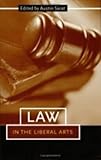Law in the Liberal Arts / ed. by Austin Sarat.
Material type: TextPublisher: Ithaca, NY : Cornell University Press, [2018]Copyright date: ©2005Description: 1 online resource (212 p.)Content type:
TextPublisher: Ithaca, NY : Cornell University Press, [2018]Copyright date: ©2005Description: 1 online resource (212 p.)Content type: - 9781501729843
- 340/.071/173 22
- KF4245.5.L3 L39 2004eb
- online - DeGruyter
| Item type | Current library | Call number | URL | Status | Notes | Barcode | |
|---|---|---|---|---|---|---|---|
 eBook
eBook
|
Biblioteca "Angelicum" Pont. Univ. S.Tommaso d'Aquino Nuvola online | online - DeGruyter (Browse shelf(Opens below)) | Online access | Not for loan (Accesso limitato) | Accesso per gli utenti autorizzati / Access for authorized users | (dgr)9781501729843 |
Frontmatter -- Contents -- SITUATING LEGAL SCHOLARSHIP IN THE LIBERAL ARTS. AN INTRODUCTION -- ONE. PERSPECTIVES ON LEGAL SCHOLARSHIP IN THE LIBERAL ARTS -- DEFENDING LIBERAL EDUCATION FROM THE LAW -- THE LIBERAL ARTS, LEGAL SCHOLARSHIP, AND THE DEMOCRATIC CRITIQUE OF JUDICIAL POWER -- ON NOT LEAVING LAW TO THE LAWYERS -- CROSSING BOUNDARIES: FROM DISCIPLINARY PERSPECTIVES TO AN INTEGRATED CONCEPTION OF LEGAL SCHOLARSHIP -- TWO. EXAMPLES OF LEGAL SCHOLARSHIP IN THE LIBERAL ARTS -- MEANING WHAT YOU SAY -- TEACHING CIVIL LIBERTIES AS A BRANCH OF POLITICAL THEORY: TOLERANCE VERSUS RESPECT -- ROMANCING THE QUOTATION -- "TERMES QUEINTE OF LAWE" AND QUAINT FANTASIES OF LITERATURE -- Contributors -- Acknowledgments -- Index
restricted access online access with authorization star
http://purl.org/coar/access_right/c_16ec
Should law be left to the lawyers? Is legal education properly understood as technical education? Law in the Liberal Arts answers "no" and suggests that our society is not well served by the current professionalization of legal knowledge. An ideal approach to legal education, in Austin Sarat's view, would open up law and legal knowledge by making them the proper objects of inquiry in the liberal arts.Legal education in the United States is generally located in law schools dedicated to professional training. Sarat believes that this situation impoverishes our ability to see the complex relations of law, culture, and society in all their variety and to connect theorizing about law with its application in the humanities and social sciences. The contributors to this book aim to assess the place of legal scholarship in the liberal arts by asking whether and how legal research and pedagogy are different in liberal arts settings than they are in law schools.
Mode of access: Internet via World Wide Web.
In English.
Description based on online resource; title from PDF title page (publisher's Web site, viewed 26. Apr 2024)


